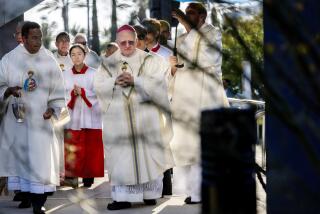Judge Rejects Scott Move to Retain Church
Calling it a âreprehensibleâ abuse of the legal system, a federal judge Wednesday rejected television preacher Gene Scottâs bid to hold on to his landmark Los Angeles church through the bankruptcy courts, clearing the way for a foreclosure auction today.
Concluding a tense, two-hour hearing, U.S. Bankruptcy Judge Geraldine Mund said she will dismiss Scottâs last-minute bankruptcy petition, noting that she found the timing of the petition âextremely suspicious.â
The fate of the historic church, known for its towering âJesus Savesâ signs, has been in the hands of the courts since Scottâs Wescott Christian Center defaulted on its $23-million contract to purchase the facility from the Church of the Open Door, which was forced into the suburbs by a dwindling downtown congregation.
In a last-minute effort to stave off foreclosure, Wescott last week transferred ownership of the church to a corporation headed by Scottâs attorney, Edward L. Masry. The corporation immediately filed for protection under federal bankruptcy laws.
The Church of the Open Door, dependent on payments from Wescott to purchase a new facility in Glendora, quickly challenged the move in the latest of a series of court battles between the two congregations.
âThe thing that is reprehensible to this court is creating a shell corporation to split off liabilities while keeping assets,â Mund said of the transfer to Masryâs Hope Street Building Co. âThat is exactly the type of thing that this court canât allow. Thatâs bad faith. Thatâs what we have here.â
Wescott announced Wednesday night that it would not pay the $17.5 million it owes--a payment that would halt the foreclosure--and instead would forfeit the $6.5 million it has already put down for the church.
But Masry said he was not certain who would bid on the property today, given that a Superior Court lawsuit is still pending and that the City Council last week voted to block any demolition permits.
âThis property in my opinion is going to be quagmired in legal difficulties for years to come,â he said.
Church of the Open Door officials, however, said they intend to proceed with the sale this morning. Judge Mund said she would sign the order dismissing the bankruptcy case after title is formally returned to the Church of the Open Door.
Scott already has moved his attack from the courtroom to City Hall, wielding the political influence that comes with his nationwide following and his friendship with city officials. Scott is attempting to persuade the City Council to declare the church a historic monument-- a move that would probably prevent demolition and discourage would-be developers.
The councilâs action to bar approval of any demolition permits was seen as a preliminary step toward seeking the churchâs designation as a historical monument.
âThat church is one hell of a long way from being torn down, and whoever tries to tear that church down is going to meet with every resource at our command,â Masry vowed.
Dale O. Wolery, associate pastor of the Church of the Open Door, conceded that the towering auditorium and adjacent hotel on Hope Street are âhistorically significant in the evangelical community, have been for 70 years.â
âBut the building is nothing more than that--a building,â he said.
âItâs apparent that Wescott has the political power,â added the congregationâs attorney, Joel Klevens. âChurch of the Open Door has right on its side, and no political power.â
It was in an attempt to preserve the 72-year-old church--located on prime commercial real estate--that Wescott purchased it last year, anticipating that Scottâs large television ministry would succeed in drawing churchgoers downtown where other attempts had failed.
But the deal hit a snag when Scott claimed to have discovered a historic trust on the property, a deed restriction imposed by the churchâs earliest founders, that pledged the church would never be sold but would be preserved âfor the holy word of God.â
Scott said he was convinced the Glendora congregation had lacked the authority to sell the church and halted payments.
The deed restriction is the pivotal issue in a pending Superior Court lawsuit that challenged the sale of the church to Scott.
Wolery said he believes Scott wanted to back out of the purchase agreement because he was not able to raise the money for payments on time. The bankruptcy petition, he claims, was an attempt to force the Glendora congregation to renegotiate the contract on more favorable terms.
But Scott told the court in a declaration filed Wednesday that it was also âthe dictates of 1 Corinthians 6â and its proscriptions against taking church matters into the courtroom that prompted him to transfer the facility to Masryâs company.
âWe could risk losing our eternal soul by continuing to sue a brother at law before unbelievers,â Scott said. âThis church must answer at the bar of eternity.â
That argument elicited a wry response from Mund, who said the court âdoes not find it convincing that Dr. Scott suddenly in March was so overwhelmed by the precepts of 1 Corinthians 6 that he had to get rid of this church to stop the fight with the other church. First Corinthians 6 didnât change between October (before the petition was filed) and March.â
Times staff writer Scott Harris contributed to this article.
More to Read
Sign up for Essential California
The most important California stories and recommendations in your inbox every morning.
You may occasionally receive promotional content from the Los Angeles Times.










